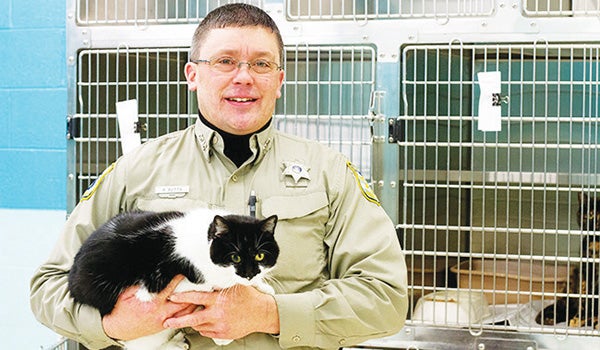Local animal control services urge owners to have plans
Published 9:02 am Thursday, April 2, 2020

- With assistance from Bergman Veterinary Medical Center in Cassopolis, Cass County Animal Control set up a mobile clinic where people could drive up with their animals and receive a vaccine. (File photo)
|
Getting your Trinity Audio player ready...
|
SOUTHWEST MICHIGAN — As COVID-19 cases continue to rise in Michigan, local animal control services and shelters remain open to respond to emergencies and to care for animals currently in shelters.
Both Cass County Animal Control and Berrien County Animal Control are closed to the public following Gov. Gretchen Whitmer’s stay-at-home executive order. However, they both maintain the care of animals housed within their shelters and stand ready for emergency calls. They are also asking pet owners to consider implementing emergency plans in case they need to be hospitalized for the virus.
“We are operating on an enhanced schedule in the morning,” said Cass County Animal Control Director Ron Butts. “We are spending time in the shelter cleaning and checking messages throughout the day. If we receive emergency calls, an officer will break and take care of those calls with minimal contact to the public.”
Butts defined emergency calls as animals that are injured — such as being hit by a car, livestock destruction and dog bites — or if someone was driving around, was arrested their companion animal needed to be impounded.
Butts added if animal control picked up a stray dog, officers will make every attempt to locate the dog’s family before taking it to the shelter.
“If the person does claim the pet and it’s in the shelter, we will deliver the pet to the person’s home in the most cautious way possible,” he said. “It would be a friendly exchange in the driveway.”
Tiffany Peterson, director of Berrien County Animal Control, echoed similar sentiments and said her department also would only be responding to emergency calls.
Both animal control shelters said they had not yet received any calls from people looking to surrender their pets during the COVID-19 pandemic.
“Given the circumstances depending on how long the stay-at-home order may be in place, we are geared up to help individuals if they come into a hardship,” Butts said. “We may be able to help them with some food. We are going to be very cautious with that, because those supplies were donated from the community, who has graciously supported us. This is just a means to provide some support back to the community in times of need.”
The Berrien County Animal Control has started a pet food drive to help families in need who are unable to provide food for their pets during COVID-19.
“We’ve gotten a lot of donations, and I hope people will be comfortable reaching out to us,” Peterson said.
The donations will be collected and distributed by Berrien County Animal Control, which plans to have people in need fill out forms, after staff have checked associated licenses.
Both animal controls are still encouraging those looking to adopt pets during this time to check online resources for animals available at the shelters.
“Because nobody is allowed in the building, we are receiving emails about some of our pets up for adoption, and we are continuing communicating with those people,” Butts said. “Once we get the green light to open back up ,people will be able to look at those pets and possibly make adoptions.”
Berrien County Animal Control has had people contact them through petfinder.com.
“We do remote access, and we work from home,” Peterson said. “We’ve had people look online, and we’ve set up an appointment with them to talk about an animal. My office manager gives them as much information as she can through email or Facebook Messenger so we can as safe as we can be. If people want to pick up the animal, they can adopt, but we have them meet us outside in the adoption gated in area, as we are trying to limit all person-to-person contact.”
Both animal control directors also expressed the importance of having an emergency plan in place for pets during COVID-19 and recommended designating an emergency caregiver.
“This day and age with animal welfare, pets are part of the family, and they need to be included with any type of emergency plan if owners have to shelter-in-place or relocate,” Butts said.
He suggested owners make sure they have an appropriate amount of supplies for their pet, like enough food, medications and medical records, as well as their pet’s emergency veterinary contact.
Berrien County Animal Control released a document advising people to create emergency plans for pets. They suggested pet owners create a kit with food, water, medicines, important documents, first-aid items, collars or harnesses with ID tags, a crate, sanitation items, a picture of themselves and their pet together and familiar items for the animal. The document was shared by local agencies across the county and reached as far as Vancouver, Washington, Peterson said.
Peterson, who takes her own dog to work every day, said her department had been working closely with a designer in the county on a brochure detailing emergency plans for pets before the pandemic hit.
“We were trying to help people with creating a kit, and it just so happened, ‘Boom, here we are now,’” she said. “This is something people need to have in place and not start doing last minute.”
The Centers for Disease Control and Prevention and the World Organisation for Animal Health have both issued statements saying there is currently no evidence that companion animals can spread COVID-19 virus or become infected.






